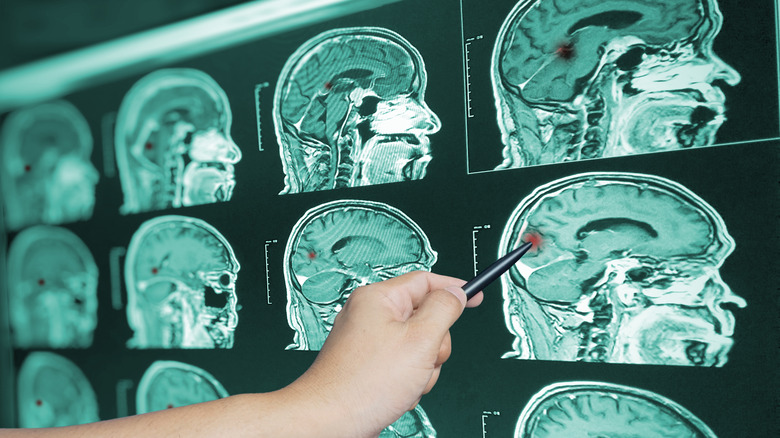How Concussions Can Impact Your Vision
Concussions are also known as mild traumatic brain injuries (TBIs). According to the Centers for Disease Control and Prevention (CDC), they are caused by a forceful blow or bump to the head. Research shows that most people sustain traumatic brain injury from falling, car accidents, assault, and injuries due to firearms (via CDC). As the name suggests, concussions can be very traumatic for the brain. Once the blow occurs, the brain may twist or sometimes bounce violently within the skull, which can injure brain cells and alter the brain's chemical state. This can lead to the following concussion symptoms: headaches, social/emotional issues, cognitive problems, sleep disturbances, dizziness, and sensitivity to light (via CDC).
Sensitivity to light, also known as photophobia, is a common complaint among people who've sustained concussions. Both brightness and glare make it challenging for the brain to focus and readjust. According to a review published in Optometry and Vision Science, photophobia is one of the most common complaints, since it can seriously impact your vision. Researchers from the review explained that 30.46% of people experience light sensitivity after the initial injury. This may take up to 3 months to completely resolve. For some individuals, it may possibly take up to 12 months or even longer for their concussion symptoms to go away.
Other ways concussions impact your vision
Concussions can bring about other ocular dysfunctions. These can mildly or severely affect daily activities, such as reading, school, work, or sports. When the vision system is affected, it can bring about a host of symptoms. According to a review by the Australian Journal of General Practice, these can include blurred vision, dizziness, headaches, focusing difficulties, trouble with eye coordination, and in extreme cases, double vision. After a concussion, these symptoms are associated with "post-trauma vision syndrome" — since the damage is sustained to the areas of the brain that regulate visual functioning (via Neurovisual Performance). The study in the Australian Journal of General Practice explained that 69% of concussion patients experience some type of ocular defects. These ocular dysfunctions include irregularities in convergence (called convergence insufficiency), accommodation (called accommodative dysfunction), smooth pursuits, and saccades.
In other cases, concussions can impact your vision by creating problems with eye tracking and slowing down visual processing (per Verywell Mind). When eye movements and processing speed are slowed or delayed, it can potentially lead to problems with sports (especially competitive sports). Data from a 2018 study found delays in visuo-manual reaction and disruption in visual tracking performance after concussions among competitive athletes. Some of these disruptions included difficulty with analyzing the speed of the ball or other players, and trouble reading distances or the field.
Concussions are common, but they can have a serious long-term impact on your vision. Never allow a concussion or traumatic brain injury to go untreated. If you're experiencing changes in vision after a bump to the head or fall, see a doctor immediately.


